The Windows Phone 7 Review
by Anand Lal Shimpi & Brian Klug on October 20, 2010 7:00 PM EST- Posted in
- Smartphones
- Windows Phone 7
- Microsoft
- Mobile
The Keyboard
The virtual keyboard is software replaceable under Android. If you don’t like what comes on your phone just download another one. Microsoft took the Apple approach and doesn’t allow swapping of keyboards. Instead, Microsoft put together what it feels is the perfect virtual keyboard. While I won’t call it perfect, it is a nice blend of Apple’s simplicity and the text replacement bar you get with some Android keyboards.
Each keypress has an ultramodern typewriter sound to it. Hold down the shift key and you’ll hear an extra tap indicating that caps lock is now active.
There are three keyboard configurations by default if you’re typing in a text field. The default one is very similar to the iOS keyboard with a few android-like additions. You get a comma and period keys as well as the emoticon button. Tapping the latter gives you two pages of emoticons for your expressive needs.
Hit the &123 key and you’ll get numbers and symbols. Hit the right arrow and you’ll see the second page. The numbers remain intact across both symbol keyboards making typing complex passwords a bit easier.
Microsoft doesn’t inject as much key spacing into the keyboard as Apple does, which can throw off iOS users. The learning curve isn’t steep though. The keyboard will autocorrect simple errors. Corrections happen based on length of word typed and location of keys pressed. For more ambiguous errors it’ll present you with a list of options in a bar above the keyboard. You can tap to select a replacement or scroll left/right to find one that may not be among the top suggestions.
If a word incorrectly shows up as misspelled, tap once to highlight and hit the + key in the suggestion bar to add it to the dictionary.
There’s typically a separate confirm/send button below the keyboard for anything that’s a non-recoverable action (e.g. sending an SMS). This is so you don’t accidentally hit enter and send something when you thought you were putting a space in between some lines.
Of course the whole point of a virtual keyboard is that it should change based on the application. Windows Phone 7 is no exception. If you’re typing in a URL box you get a dedicated .com key for example. Typing in an email field gives you dedicated @ and .com key. The calculator app has its own custom keyboard layouts (one for portrait and one for landscape).
To position a cursor in iOS you tap and hold until you get a magnifying lens that helps you fine position your cursor. Android relies on arrow keys or a trackball (optical/physical). Windows Phone once again borrows from Apple. You tap and hold but instead of getting a magnifying lens, a theme-colored cursor appears above your finger. Simply drag your finger down and out of the way to position the cursor exactly where you want it. It feels awkward at first, but it makes a lot of sense once you get used to it.
Overall the keyboard is great. If you’re used to iOS, there’s a bit of an adjustment period but you’ll pick it up right away. If you’re coming from Android (except for Swype) I believe you’ll find it a pleasant balance between iOS and Android keyboards. And if you’ve never used a virtual keyboard before, you couldn’t have a better starting point.


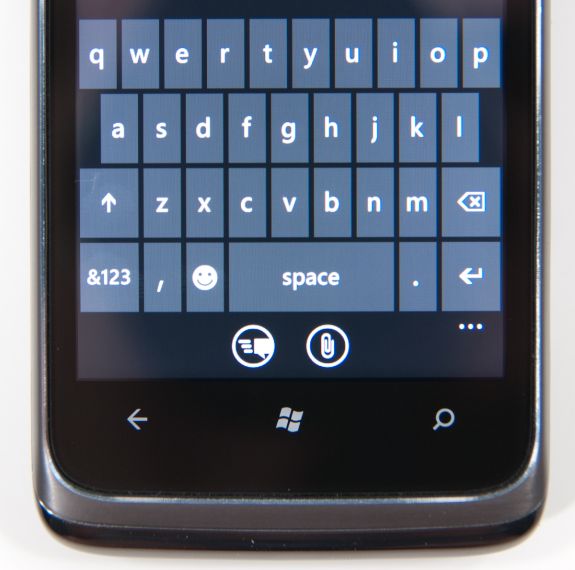
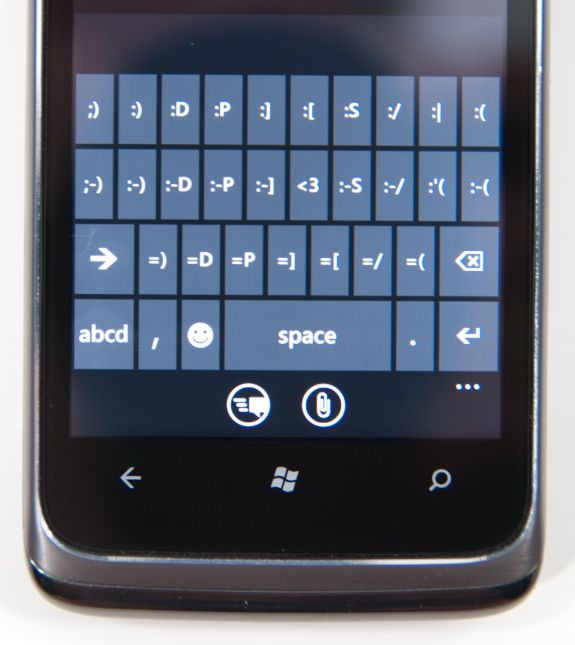
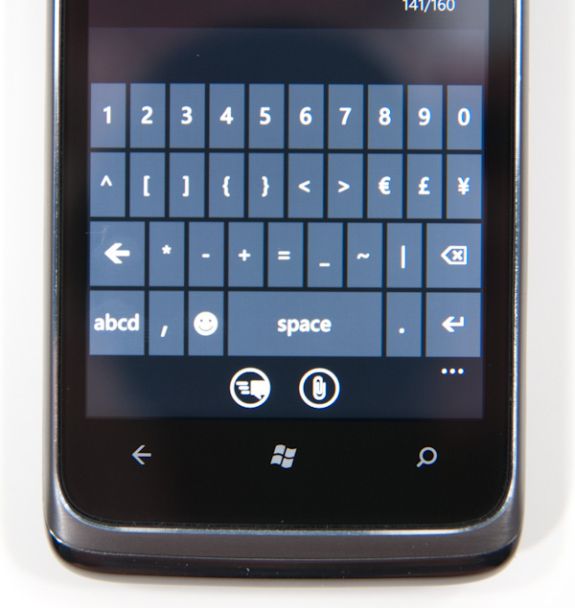
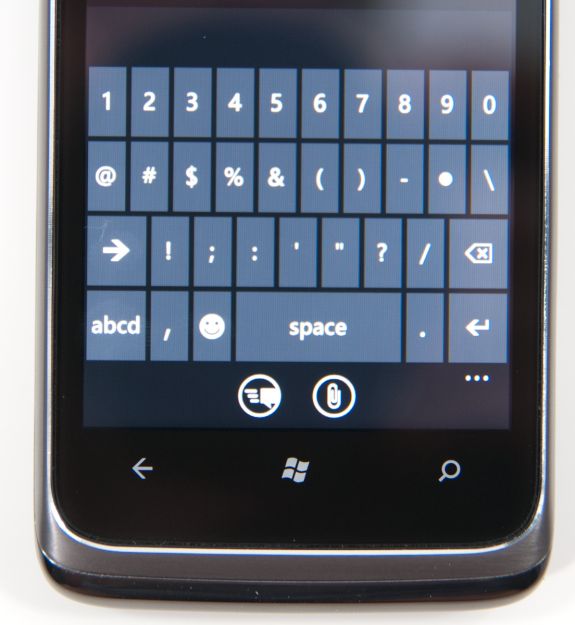
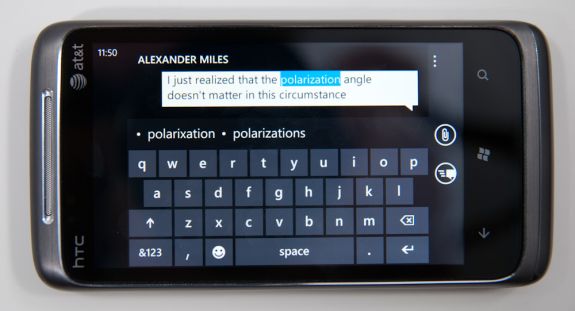








125 Comments
View All Comments
Shadowmaster625 - Friday, October 22, 2010 - link
It cant play avi files? What do you call a $500 device that cant play avi files? FAIL.beefnot - Friday, October 22, 2010 - link
I'm so sick of seeing "fail" in user comments. 99% of the time, it follows a point or points being made that wouldn't have swayed them to deem it worthy anyway. YAWN.mutatio - Friday, October 22, 2010 - link
I'm glad you guys found it to be as smooth and useful as you did. Based on what you described and the corresponding pictures, however, I'm having a hard time understanding something "just works" when the UI looks like a crap sandwich and almost makes my eyes bleed. "No, we don't use those oh-so-80's icons that graphically represent what the App does. We're much too posh for that, minimalist traffic signs for everything! Brilliant!" Maybe it'll be different with hands on, but it looks like MS went out of their way to try and make this thing look clever and almost abstract. Think myspace made into a smartphone, and if you're like me and think that myspace pages more often look like pop culture chewed up, swallowed, and thrown up onto a web page, then you get where I'm coming from. If that is the case when I get my hands on one of these, I can't see how MS can get any significant traction in the smartphone market. They might get some young emo hipsters who dig the abstract layout, but the appeal thus far of iOS and Android is the overall ease of use. My impression from your review, despite your reassurances, is that MS has again made a product much more complicated than it needs to be. I hope for MS' sake that is not the case when actually using the phone.MacGyver85 - Saturday, October 23, 2010 - link
You'll just have to try it to appreciate it I guess.I can understand people when they say the interface looks bland or overly simplistic based on "screenshots" of the UI. But when you see it in person it's so much better. Really.
Likewise with how you navigate around it. It's just so intuitive you don't for a second have to think how to do something. Every time someone asks me if what it's like I always respond that they'll have to use it themselves. And everyone that does loves it. Seriously :)
Dare I use it but what the hell: it just works!
DJJoeJoe - Saturday, October 23, 2010 - link
I don't think any OS at this point can grab a drastic number of market share like we see in the phone space obviously, or even the slightly slower moving browser space. Modern Operating Systems are so mature at this point that there is really little you can do, both Win7 and Snow Leopard were just small refinements to their previous versions.I think it's doubtful that even something as force-ably drastic as Chrome OS will do anything to the landscape either, even if Google bucketed down and really nailed it. Sadly the market share is ruled by the people going to costco and grabbing up a pre made pc, or large corps running xp, and I can't see something drastic being sold to either groups in the next handful of years.
tis all in the phones these days, and I wish I had a time machine so I could get the second wave of hopefully nicer wp7 handsets and maybe a good update to the os itself. Don't got the money to spend on a 'amazing start'.
Sabresiberian - Monday, October 25, 2010 - link
Looks to me like Vista's bad press helped Apple reach 9% market share, but that's as far as they've moved up. Win 7 is sweet and everyone knows it so Apple is no longer making headway.I don't want Microsoft execs to think that way though - like was written in the article, I think Microsoft performs better as an underdog, and if they think more in terms of being threatened by Apple or someone else then perhaps they'll be more inclined to put a shining example of what they can do out on the market.
Glad to see Microsoft did produce a product with some shine.
;)
dotroy - Thursday, October 28, 2010 - link
Windows 7 phone is good ...umm ..some things not as good ..but win7 phone is good, there are somethings done better by others OS but win 7 phone is good. I never felt like this before. This is a paid advertising. Anand is making good money.pete2s - Thursday, October 28, 2010 - link
Will Windows 7 Phone store apps on the ROM partition? If so, this severely limits the number and size of apps as well as their quality.Although Android is evolving past this limitation, Android, Blackberry and Palm phones store the OS and all apps on an encrypted partition referred to in the specs as the ROM. Usually, this ROM is 512MB. After the OS is installed, the phone has less than 300MB for apps.
Initially, I thought Windows 7 Phone would not store apps on the ROM because of its unified storage system that creates a single volume. If this were the case, however, there'd be no point in having a larger ROM because the ROM would only be holding the OS + the 60MB limit of pre-installed software. Some phones, like the Samsung Focus, do have larger ROMs though (1GB compared to 512MB). The only point of having a larger ROM would be to store more apps because apps are installed to the ROM.
If the above is true, Windows 7 Phone will be severely limited in app size and thus development.
drwho9437 - Monday, November 1, 2010 - link
"It’s almost as if Microsoft is taking Apple’s approach and simply letting everyone build iPhones."Exactly and it is genius, it means the cost margin will vanish and the experience will still be as the software people want, people won't think poorly of these phones just because of a few badly designed devices they used. Let's hope it works out.
owbert - Monday, November 1, 2010 - link
best review of win7 phone amongst others. great work!